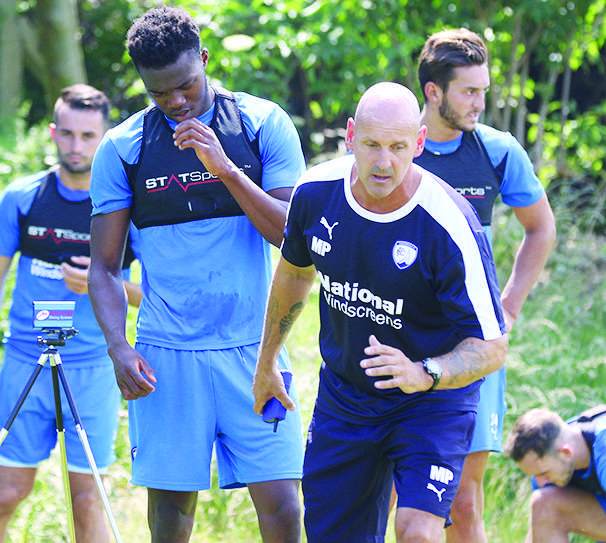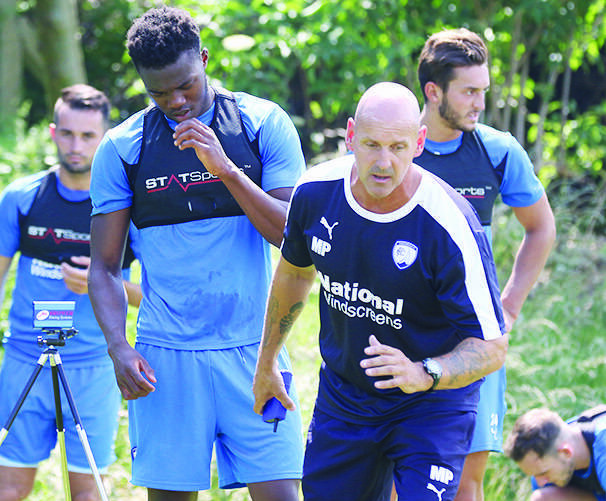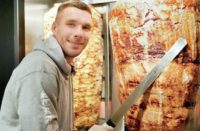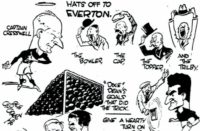 Spend five minutes in the company of Chesterfield’s strength and conditioning coach, Mal Purchase, and you are left with no doubt that the ex-serviceman knows exactly how to construct and maintain an elite professional athlete.
Spend five minutes in the company of Chesterfield’s strength and conditioning coach, Mal Purchase, and you are left with no doubt that the ex-serviceman knows exactly how to construct and maintain an elite professional athlete.
Revolutionising the club behind the scenes, Purchase is establishing a grounding in sports science to rival those of Premier League clubs as he strives to see the League One outfit achieve to the degree of his unrelenting ambition.
“When you start your work for a football club you’ve got to be like a supporter, you’ve got to give everything you’ve possibly got,” began the 51-year-old, who returned to English football at the start of this season after a spell in India’s I-League. “When you come here you’ve got to have blue blood running through your veins; you’re the same as them and you’ve got to give everything for Chesterfield Football Club.
“Chesterfield’s a good club and you run it professionally like everywhere else you go, you don’t treat it any differently – you just do the same as if you were working in the Premier League, nothing changes.”
His evident desire to succeed is duly matched with an extensive physiological knowledge attained from a background in track and field, which has provided the Welshman with the ability to develop the athletic attributes he believes are key in professional football: sprinting, jumping and endurance.
The former Doncaster and Wolves fitness coach has completely transformed the approach to strength and conditioning at the North Derbyshire club this term, eradicating a culture of guesswork and estimation to promote one of control, precision and accuracy.
And his knowledge and ability have seen his services retained by the Spireites despite a start to the season which saw Dean Saunders and his assistant Brian Carey dismissed in December. The vastly experienced Danny Wilson has since taken over in the hotseat.
“We’ve put a lot of sports science base into the club now whereby we don’t guess,” he explained.
“We test for speed, power, agility and football specific endurance with monitoring on the GPS of every step of every single day.
“We go through everybody’s figures. All of the players get different statistics and we know where their parameters are, so we know exactly what we’re looking for in each of them.
“There’s no more guesswork in it. People always said it was a fit team at Chesterfield but you’ve got to measure fitness or else we will never know the real answers.
“Now we’ve got real scores for the sprints and agility and so we’ve measured performance; nobody would know that Usain Bolt was quicker than Carl Lewis if we never had timing gates, so now the evidence is there and we know whether we’re a fit team or not.”
The scientific approach favoured by Purchase has also seen a change in injury management and prevention at the club, a key element in his job description at a club with a smaller squad.
“When it comes to rehabilitating players, we know exactly what speeds they can run at: how many accelerations, decelerations, sprints and how much distance they do in training. And, for that specific position and player, we know exactly what to give them. “We’ve got a lot of people now running over nine metres per second (20 mph) whereas when we were here for the first two weeks of pre-season we didn’t get anybody over that.
“We had to implement biomechanics, conditioning, speed and agility drills and now we’ve had nine players who can run at over that speed. You test in training and you compete, that’s the way we work.”
While his passionate approach to fitness coaching saw success with Doncaster and a spell in the Championship with Wolves, it was at Wrexham where Purchase initially plied his trade in football fitness coaching and where he would meet several like-minded coaches as sports science began to surface in football.
“My route into football started many years ago when I was in the gym in Wrexham. There was a footballer called Joey Jones who used to play for Liverpool; he used to come and watch me do boxing in the gym and he used to join in with us,” he recalled.
“He used to referee a few fights that we would have up in the dark room, so there was a bit of claret spilt every Friday afternoon when we were in there.
“This was at the end of his career really and he invited me to come and do some training at Wrexham so I’d go and train the footballers on their fitness and I worked with Brian Flynn there.”
While overseeing the fitness training at Wrexham, Purchase met a player who would go on to succeed in the world of strength and conditioning and the pair have remained close ever since.
“I went off and did a bit of work with Damian Roden at Manchester City looking at their set-up and what they were doing,” he said of the current fitness coach at Stoke City, and a leader in the field after heading sports science departments at Bolton Wanderers, Blackburn Rovers, City, Australia and Wales.
“Sports science was starting to take off in football then; from the early stages of sports science in football I was at the start of it so I have seen how it’s progressed up to where it is now. The systems that we’ve put in place here at Chesterfield – with the testing and the GPS monitoring – are right up to date with all the top teams in the top leagues.
“I’ve got many friends who work in football who work at the top level all over the world and we’re the first to know about anything that is new which comes onto the scene, and if it’s suitable for our football team then we run with it.”
And it is not only in the UK where Purchase has worked in football. A period in India, where his successes with Bengaluru saw him face Sven-Goran Eriksson’s Guangzhou R&F in the Asian Champions League, saw him face conditions polar opposite to those of North Wales.
“A friend of mine, Ashley Westwood, who I worked with at Wrexham before he was the assistant manager to Michael Appleton at Blackburn, asked me to come to India,” he said.
“We went over there and took all the sport science with us; it’s obviously very hot over there so all of your training has got to be spot on.
“It really does test your skills when you’re playing in 100 degree heat and we’re trying to play a pressing game, so all your knowledge comes in on the nutrition, on the loading phases and cooling the body temperature down in high humidity because the sweat system doesn’t really work then.
“You’re using all the ice gloves and towels, trying to get them on the pitch every 20 minutes just to cool the body temperature down and getting the correct amount of fluids in.
“We started off the league very well and we continued to progress. We changed all their nutrition habits that weren’t very good to start with and we made them physically fit, strong and powerful – and we won the league.
“After winning the league, we won the Federation Cup then we qualified for the Asian Champions League and we got out of the group stages at the first attempt. We were very successful in India with a new team and it just shows you what you can do when you take sports science to a country like that.
“It was a really good test. There are lot of teams that go to World Cups and you see their players cramping up and things like that, but that never happened with our team. It was well documented in the press out there how fit we were and they were surprised how we never got any injuries – they couldn’t work out what was happening.
“We just brought all the best sport science and it shows you it works.”
And Purchase is confident that the systems are in place at the Proact Stadium to mirror the success he enjoyed in India in the long-term.
“We’ll do things properly at this football club and we’ll run it like a Premier League club because that’s where we want to go. There’s no reason why Chesterfield can’t get there,” he added. “I think with teams like Bournemouth and Watford getting up there and previously Swansea, there’s that carrot which has come back again.
“A few years ago it seemed it was impossible to get to the Premier League, but now I think a few teams are starting to believe that they can get there – and Chesterfield shouldn’t be any different. They should start believing that they can get there. There’s a lot more science in the game now and there’s no reason why we can’t make it.”


















